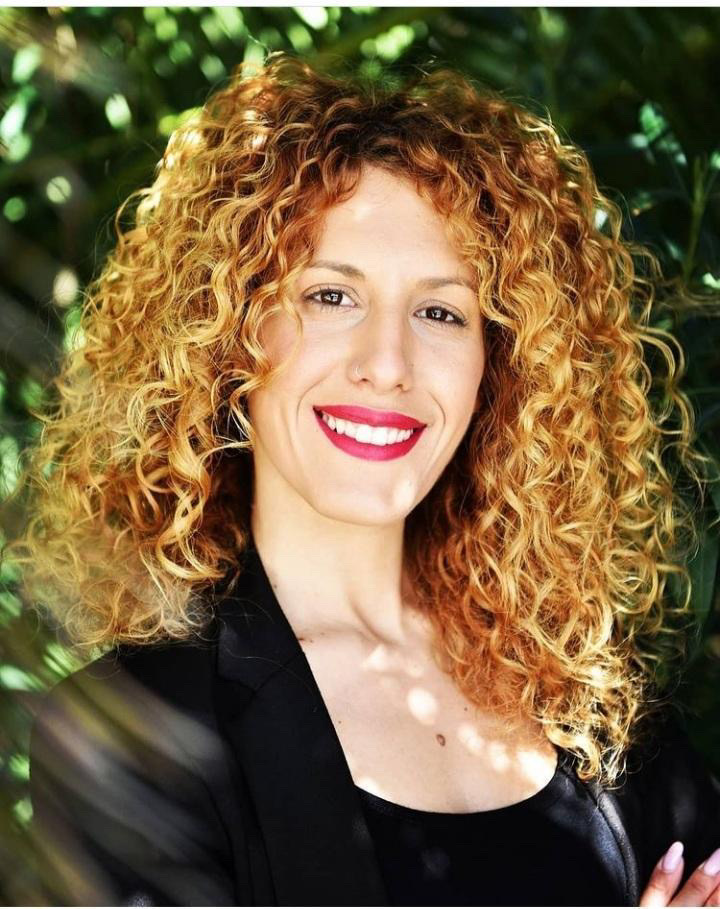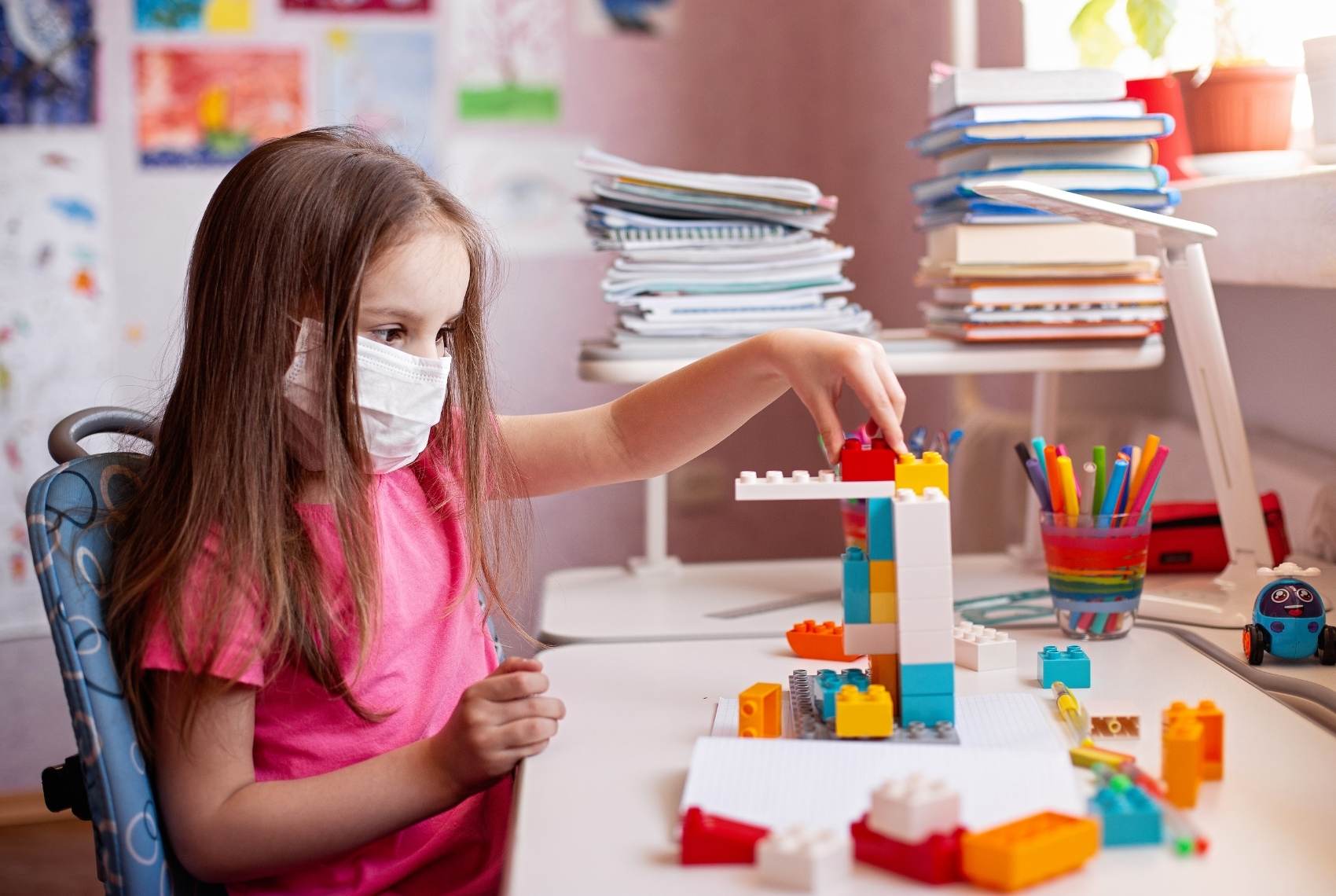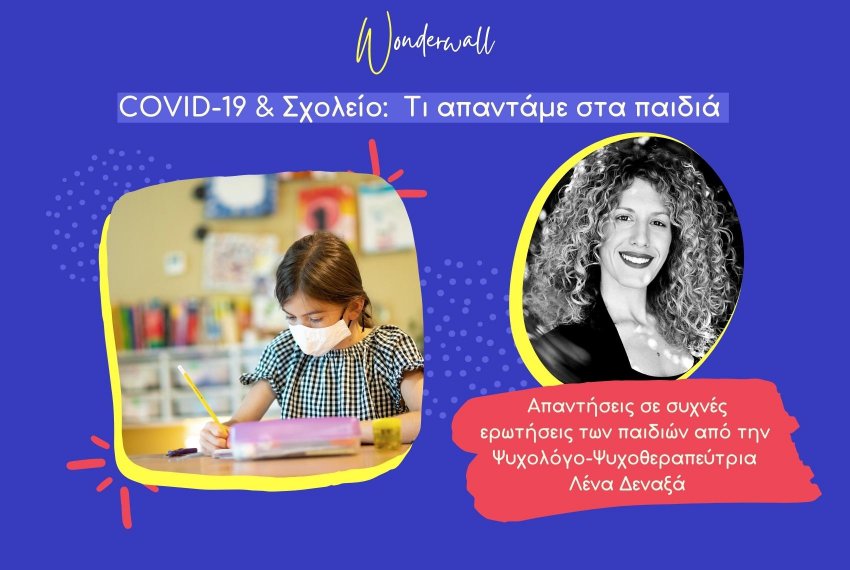Going back to school, most of the time, is not an easy task! And it is even more difficult after the holidays, or after all the snow and ice that conquered the courtyards! But beyond all this, one issue that has prevailed over the last two years in the return of children to school is the issue of COVID.
It is very common and understandable that there are still questions around this issue, which in combination with the prolongation of the pandemic has made tired both children and adults.
In situations that cause anxiety, stress and are full of doubt, we can consult experts. In this way, we can better understand our children's feelings about situations but also fight stress and anxiety. That is why we spoke with Lena Denaxa, psychologist-psychotherapist and family counselor, to discuss these questions. The discussion will of course help getting back to school but also your daily life and your children’s.
About Lena

Lena is a Psychologist-Psychotherapist, specialized in Systemic Psychotherapy. She initially studied in the Department of Psychology of EKPA and was extensively involved in postgraduate training in Clinical Psychopathology, Synthetic Systemic Psychotherapy, in the "Intervention Program for Children with Diffuse Developmental Disorder" and later in "Clinical Practice in Special" Today, she attends certified training in order to specialize in "Eating Disorders and Obesity".
From 2012 until today she is occupied with psychotherapy in children, seeking the participation of parents, but also with psychotherapy in adults.
She is extensively involved in volunteering, through which she has been involved in various programs. One of them is KETHEA, in which she worked voluntarily for two years. She deals with the commons, wanting to help the needs of her fellow human beings, especially those who belong to vulnerable groups.

-How can we talk to our children about covid, how it is still here and they should be even more careful?
Children understand much more than we can imagine. Especially nowadays when information is spread everywhere. Covid has been invading our lives for about two years now. All this time the children have been bombarded with a wealth of information about the virus and how they could protect themselves from it. So talking about it all the time is anything but helpful. On the contrary, it can create more tension and discomfort for them than they are already experiencing.
The attitude of the parents and their own example are often enough for the children to understand what they have to do. Where this is not the case and the parents consider that the children are endangering themselves and those around them, by not observing the protection measures, it would certainly be worth having a relevant discussion. However, they need to clarify if the child really does not understand or if it is a way to express their dissatisfaction with what they are experiencing. In this case, before we explain the rules once again, it may be more helpful to dwell on how they feel.
Whatever the reason for the children resisting, yelling and punishment are not allies. On the contrary, discussion, good arguments, and the recognition of the pressure they are experiencing all this time, can contribute to the desired result.
-How can we deal with their anxiety about the virus?
Emotions such as anxiety or fear are reasonable for both a child and an adult to experience, especially in times of crisis, such as the one we are going through. That's why before a parent wonders how to deal with their child's anxiety it is very helpful to get in touch with how he or she is feeling. To wonder about their own anxiety and how they take care of reassuring themselves. It is important to emphasize that children listen to how their parents feel and coordinate with them. So, no matter how good their intentions are, it is not enough to reassure them.
It takes composure and availability on their part so that children feel they can turn to them when they need it to discuss their concerns. Finally, great attention needs to be paid to the information they receive daily from the various media and social networks.
-If a friend or relative is positive, how can we fight the fear they may have?
And in this case, the most important thing is for the parents to be available to listen to the questions and concerns of the children and to talk to them, and not to avoid it due to their own personal difficulty, because this can cause them more anxiety and fear for what can happen to their loved one and consequently to themselves.
The answers of course depend on the state of health of the person who is ill. If, for example, the patient goes through it with mild symptoms, we explain it to the child and if possible we can seek some distance communication, in order to reassure them even more. On the other hand, if the patient is seriously ill, we invoke the valuable contribution of doctors, who will help so that their loved one gets well soon.
-Is it better to answer only their questions or is it right to mention it in the discussion?
- (If yes) how can we bring COVID into the debate?
Two years later the most important reason to discuss covid is to have a sharing of feelings, thoughts, concerns between the members of a family. Sharing in a context where there is support and understanding is an amazing way to connect and unwind. Many times, solutions are not needed for a child to feel better, but a parent who can listen to them, respecting their concerns, while at the same time giving them a tight hug. Sharing in a safe environment creates a sense of relief, which reassures children and allows them to think more optimistically about the future.
So, parents do not need to create a special condition to discuss the issue of covid. All that is needed is openness on their part, both so that the children can turn to them for any question and so that they can observe any change in their child's mood and help them. In any case, the goal of any discussion should be to reassure the children and not to create additional stress for them.
-How can we approach their lack of appetite for activities or the inability to arrange playdates and activities with other children outside of school?
Among all the changes caused by the pandemic were the successive changes in the children's daily routine. The many hours that children were forced to stay home, away from friends and favorite activities, was one of the most important. The long period of abstinence, as well as the bombardment of frightening news, have contributed to the difficulty of many children adapting, and even withdrawing from their social environment. In these cases, it is very important to review the child's daily schedule. How much time they sleep, how much time they invest on the computer, if they do any physical activity, how they eat. In addition, it is equally important for parents to observe how they live during this period, how they experience this period and what their own living conditions are. Family is a system whose members influence each other. Given that this system is the refuge of children, we understand that stability within is necessary in a period of complete destabilization.
-How do we manage their questions about the future of the virus?
With honesty!! On this question, I would like to remind you of something that is often heard, but I have the feeling that parents need to hear it. Becoming a parent does not mean that you must know everything. "I do not know" is a phrase that has a lot of value throughout the parenting journey. The rewarded "I do not know" allows the parent to enjoy their role more and at the same time helps to be a better listener. It helps them learn more and not get caught up in the belief "I have to know everything to be a good parent". So, in this case we do not give hope and we do not say something we do not know. The specialists are the doctors. We can talk to the child saying: “You are tired. I understand you because I feel the same way. I hope it all ends soon, but I cannot tell you exactly when, because I do not know. Until then, we can try to do things that please us, without neglecting the protection measures."
In closing, let us not forget that hugs, kisses, smiles, contact, communication have been and will always be vital.
Unfortunately, we are in a time when regular things have become in demand and that is sad. The effects that result from the lack of all the above on the psycho-emotional health of children and consequently on their social life are of major importance. If it passes through our hands, let us not let fear overwhelm us and let the masks take us away. Staying safe may be paramount. However, it is equally important to keep young and old connected, creating a safety and communication network through the relationship between us.
tag:Wonder Wall


